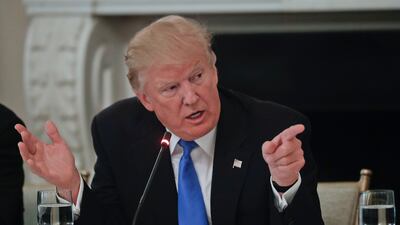First Donald Trump certified Iran’s nuclear deal even though he “did not want to”. Then his administration imposed new sanctions against Tehran’s activities without designating Iran's Islamic Revolutionary Guard Corp as a terrorist organisation.
The US president appears to be keeping his options open on Iran, as his administration struggles to finish a policy review, which was supposed to be wrapped up this summer but could now drag on until October.
On Monday, Mr Trump for the second time since he took office decided to certify Iran's compliance with the nuclear deal, known as the Joint Comprehensive Plan of Action, but according to The New York Times, he did so reluctantly.
The newspaper reported that the president spent 55 minutes of a July 12 meeting with his national security staff telling them he did not want to certify the deal and will not keep doing so, expressing frustration over Iran’s behaviour.
‘Good deal, bad regime’
Mr Trump’s dilemma is in part due to the political reality that “the nuclear agreement has thus far proven to be a good deal but with a bad regime”, said Karim Sadjapour, a senior fellow at the Carnegie Endowment for International Peace.
Few on the right, who wanted Mr Trump to pull out of the agreement, “are willing to admit the former, and many on the left try to downplay the latter”, he added.
Mr Sadjapour saw political expediency for both Washington and Tehran in keeping the deal for now.
“Neither the US nor Iran will want to be blamed for walking away from the agreement … and if the deal unravels, it’s highly doubtful a better deal could be renegotiated,” the expert said.
Sam Cutler, a former foreign policy adviser and an expert on sanctions, said the lack of a strategy or any sort of comprehensive policy approach on Iran had led to the nuclear deal being certified.
“They have no idea what their preferred policy approach is, so they maintain the status quo while issuing some relatively minor designations to cover themselves politically,” said Mr Cutler.
A US official told The National that "the Trump administration is currently conducting a comprehensive review of our Iran policy and, at least until this review is completed, we will adhere to the Joint Comprehensive Plan of Action and will ensure that Iran is held strictly accountable to its requirements".
Another US official told the Washington Post that "the review should be completed before the next certification deadline in October". Under US law, the president must certify the agreement every 90 days, and the next deadline is on October 16.
New Sanctions
Hours after certifying the deal, the Trump administration ratcheted up unilateral sanctions on Iran designating 18 individuals and entities accused of sponsoring activities, including missile development, weapons procurement and cyber theft.
“This administration will continue to aggressively target Iran's malign activity, including their ongoing state support of terrorism, ballistic missile programme, and human rights abuses,” treasury secretary Steven T Mnuchin said.
The list of those designated included two companies, Qeshm Madkandaloo Shipbuilding Cooperative and Emily Liu, based out of Turkey and China respectively.
Also on the list was the Iran-based Ajily Software Procurement Group, which was accused of using “hackers to steal engineering software programmes from the United States and other western countries.”
Mr Sadjapour said the sanctions draw a distinction in tactics between Mr Trump and his predecessor, Barack Obama.
“The Obama administration pursued coercion when engagement failed,” he said. “The process helped them obtain strong international support for sanctions against Iran.”
With the Trump administration, however, their “instincts are to forego engagement and move immediately toward coercion”, a strategy that — aside from few countries — is not backed by the international community, explained Mr Sadjapour.
“At the moment there is no international unity vis-à-vis Iran nor is there any diplomacy,” he added.
As for the impact of the sanctions that stop short at designating the Revolutionary Guards a terrorist organisation, Mr Cutler does not see a serious blow for Tehran.
“None of the designations will have significant economic impact or produce more than a minor deterrent effect,” he said.
“At least one of the companies is already listed by the Commerce Department and some IRGC entities have already been subject to sanctions as affiliates of the group,” said Mr Cutler.
He added that the two Iranian men designated for cybercrimes, Mohammed Saeed Ajily and Mohammed Reza Rezakhah, have a very low chance of going into custody.
For now, Iran’s nuclear deal gets another 90 days of lifetime under Donald Trump.
“A more likely scenario is regional tensions lead to escalation and both sides accuse the other of violating the deal,” predicted Mr Sadjapour.
"It's Donald Trump, so who knows what he'll actually do," said Mr Cutler.


